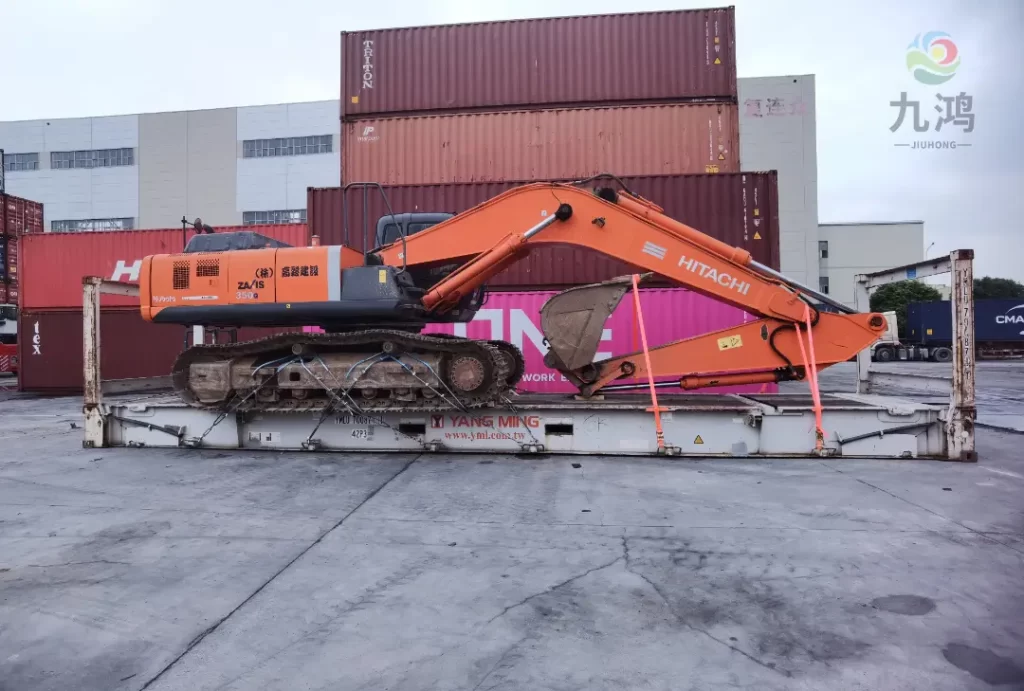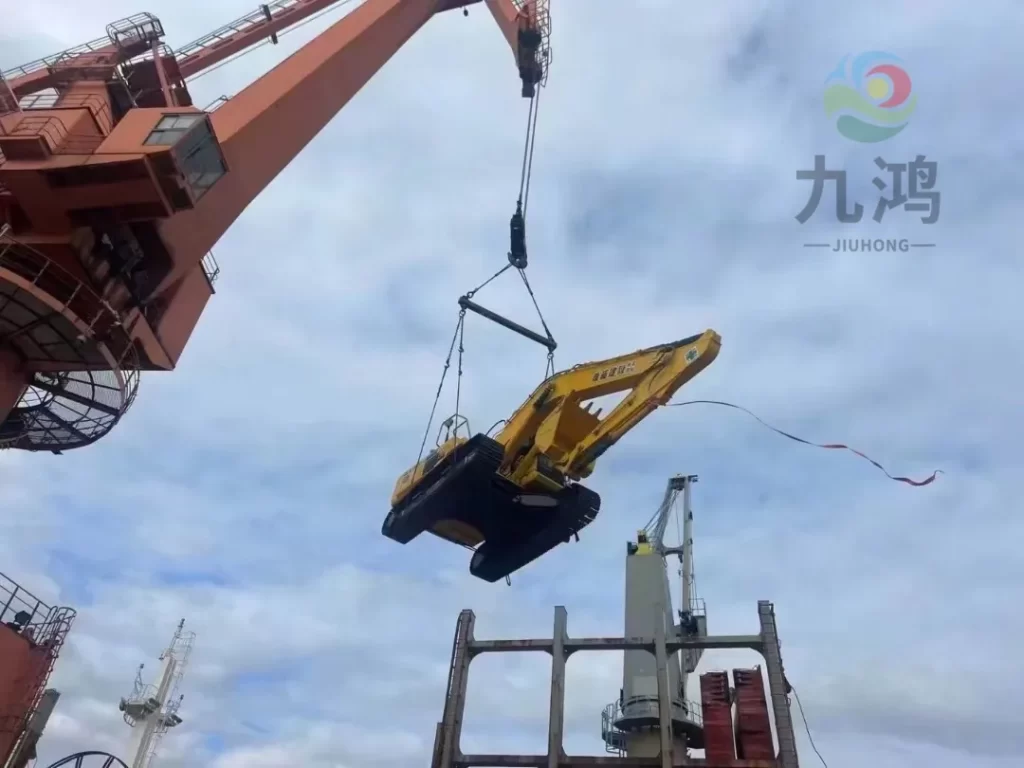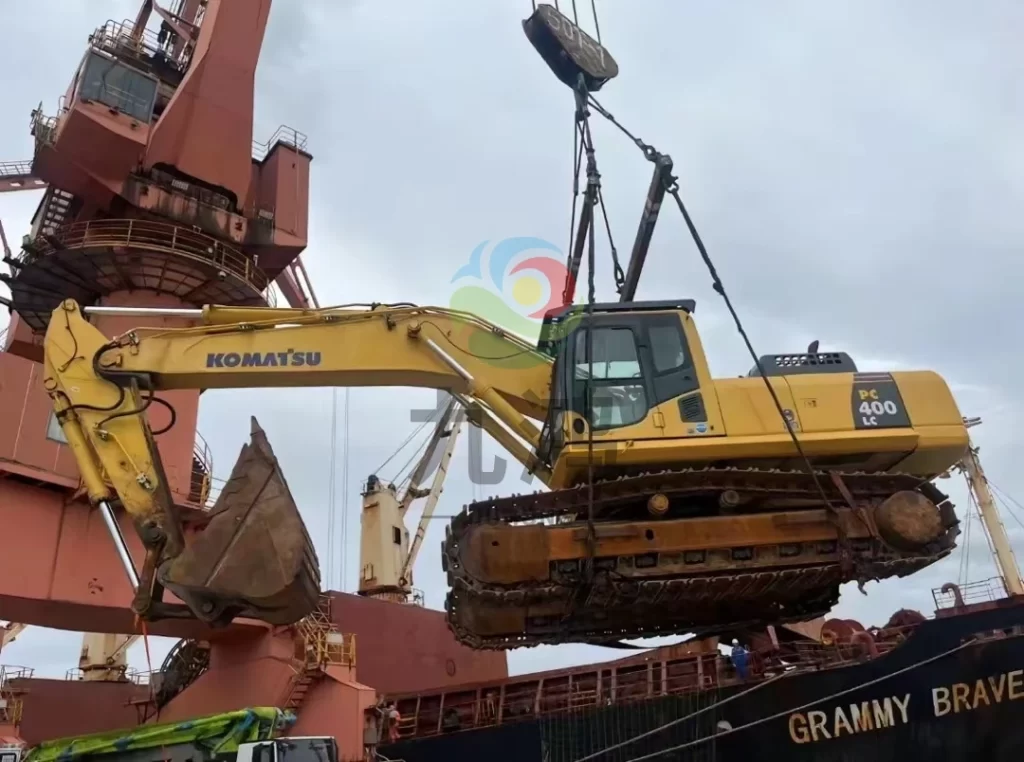عند نقل معدات البناء المستعملة إلى أفريقيا، هناك نقاط تحتاج إلى الاهتمام:



التحضير قبل الشحن
فحص الآلات: افحص الحالة الميكانيكية للمعدات جيدًا، بما في ذلك المحرك والنظام الهيدروليكي ونظام ناقل الحركة والنظام الكهربائي، للتأكد من أنها تعمل بشكل جيد. قم بإصلاح أو استبدال أي أجزاء معيبة. نظف المعدات جيدًا، وأزل الأوساخ والصدأ وبقع الزيت. هذا لا يجعل المعدات تبدو أفضل فحسب، بل يمنع أيضًا التآكل أثناء النقل.
إعداد الوثائقأعدّ قائمة تعبئة مفصلة، مع توضيح طراز ومواصفات وكمية ووزن كل قطعة من المعدات. اجمع فاتورة الشراء الأصلية، ودليل المعدات، وسجلات الصيانة لإثبات منشأ المعدات وتاريخ استخدامها. قد تشترط بعض الدول الأفريقية شهادات أو تصاريح خاصة لاستيراد المعدات المستعملة، مثل شهادات فحص الجودة وشهادات حماية البيئة. من الضروري فهم المستندات ذات الصلة والتقدم بطلب للحصول عليها مسبقًا.
التعبئة والتغليف والعلامات التجارية
التغليف المناسب:استخدم مواد تغليف عالية الجودة لحماية المعدات من التلف أثناء النقل. بالنسبة للمعدات الكبيرة، استخدم الصناديق الخشبية أو الإطارات الفولاذية للتدعيم؛ بالنسبة للأجزاء والملحقات الصغيرة، استخدم الأكياس البلاستيكية أو الكرتون للتغليف ووضع علامات عليها بوضوح. قم بإغلاق التغليف وتعزيزه لمنع دخول المطر والرطوبة والغبار.
علامة واضحة:قم بوضع علامات واضحة ودائمة على المعدات، بما في ذلك اسم المرسل والمرسل إليه، وميناء الوجهة، وطراز المعدات والرقم التسلسلي لها، وتعليمات المناولة. استخدم اللغة الإنجليزية واللغة المحلية للبلد المقصد لوضع العلامات لضمان قدرة موظفي المناولة على فهمها.
اختيار وسيلة النقل
الشحن البحري:إنها الطريقة الأكثر شيوعًا وفعالية من حيث التكلفة لنقل معدات البناء المستعملة الكبيرة والثقيلة. اختر شركة شحن موثوقة تتمتع بسمعة طيبة وخبرة غنية في نقل معدات البناء. احجز مساحة الشحن مسبقًا، وخاصة خلال موسم الذروة، لضمان شحن المعدات في الوقت المناسب. عند تحميل المعدات على السفينة، من الضروري ضمان الوضع والتثبيت المناسبين لمنع الحركة والاصطدام أثناء الرحلة.
الشحن الجوي:مناسب لنقل المعدات الصغيرة والضرورية، على الرغم من ارتفاع تكلفته نسبيًا. يُقلل الشحن الجوي من وقت النقل بشكل كبير، مما يُفيد العملاء الذين يحتاجون إلى المعدات بشكل عاجل. عند اختيار الشحن الجوي، من الضروري اختيار شركة طيران تتمتع بسجل سلامة جيد، والتأكد من أن المعدات تُلبي متطلبات الحجم والوزن الخاصة بها. يُمكن نقل بعض قطع الحفارات بهذه الطريقة.
التخليص الجمركي وأنظمة الاستيراد
التخليص الجمركي:تتكون أفريقيا من العديد من البلدان، ولكل منها لوائح وإجراءات جمركية خاصة بها. ومن الأهمية بمكان أن يكون لديك وسيط أو وكيل جمركي محترف للمساعدة في عملية التخليص الجمركي. يجب توفير مستندات إقرار جمركي دقيقة وكاملة لتجنب التأخير والغرامات. تطبق بعض البلدان الأفريقية سياسات تعريفة جمركية صارمة على الواردات، وقد تختلف معدلات التعريفة الجمركية للمعدات المستعملة عن تلك الخاصة بالمعدات الجديدة. من الضروري فهم لوائح التعريفة الجمركية ذات الصلة مسبقًا وحساب تكاليف الاستيراد بدقة.
حظر وقيود الاستيراد:تحظر بعض الدول الأفريقية استيراد أنواع معينة من معدات البناء المستعملة، مثل المعدات التي لا تلبي المعايير البيئية والسلامة المحلية. قبل الشحن، من الضروري فهم حظر الاستيراد والقيود المفروضة في بلد المقصد بشكل كامل لتجنب احتجاز المعدات أو مصادرتها في الجمارك.
خدمة ما بعد البيع وتوريد قطع الغيار
إنشاء شبكة الخدمة:إنشاء شبكة خدمات ما بعد البيع في أفريقيا لتقديم الدعم الفني في الوقت المناسب وخدمات الصيانة للعملاء. وهذا من شأنه أن يعزز رضا العملاء وولائهم ويساعد في ترسيخ صورة العلامة التجارية الجيدة. وتدريب الفنيين المحليين لتحسين قدرتهم على صيانة وإصلاح المعدات، وضمان توريد قطع الغيار للحد من تعطل المعدات.
توريد قطع الغيارضمان توفير إمدادات كافية من قطع الغيار في أفريقيا. إنشاء مستودعات لقطع الغيار في الأسواق الرئيسية أو التعاون مع موردي قطع الغيار المحليين. تزويد العملاء بقائمة بقطع الغيار الموصى بها وقنوات شرائها لتسهيل حصولهم عليها.

